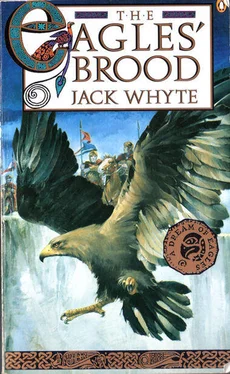He sniffed, and reached for the flask again, pouring the few remaining drops into his own cup after I had waved it away from mine. "Well then," he murmured, "let me help you, since I know what you need to know but may be loath to ask." He sipped, sighed and placed his cup by his feet. "In the matter of excommunication for past sins, I issued no decrees. I had taken to heart, you see, your eloquent observation that, in the absence of formal guidance from outside, from Rome, you and your people were and are honour bound to live by the teachings of your bishops and your early faith. No man could find fault with that, Merlyn; its truth is self-evident." He paused, mulling over his next words, then continued. "The benefit of the doubt, therefore—that sophisticated wisdom propounded by your father and so ably transmitted by you to me—must be applied to all in like case. So there have been no major..." He sought the correct word. ".. .proscriptions ordained. And yet heresy is heresy and cannot be countenanced." He stopped again, eyeing me shrewdly.
"I know how your soldier's mind works, I believe. I know you have no patience with sophistry, so I'll speak plainly." He hitched himself erect and the pleasant mellowness faded visibly from his features. "As a soldier and an officer, you have high regard for the law. You must have; it goes with the responsibility...It is the law itself I speak of now; the Church's law, with all the awesome responsibility that entails. Apart and aside from all of the polemical and theological discussions that have unfolded here in Verulamium these past two weeks, one truth has been brought home, I believe, to the bishops assembled here from all over Britain: without law there is chaos. We saw the truth of that on our arrival here. That truth loses nothing of verity in the governance of God's affairs on earth. Somehow, somewhere, there must exist a central core of ratified, accepted truth—of dogma, if you like—if existence is to continue sanely. The confrontation of philosophies between Pelagius and Augustine of Hippo resulted in an impasse that had to be resolved. A reasoning, educated man can see much apparent truth, much plausibility, on either side of the debate. But those differences are merely philosophical, Merlyn, and therefore human. They are not, at bottom, theological. Within that difference lies the ordinary man's inability to comprehend the nature, and the seriousness, of the dispute." He paused again, watching me to see how I was responding to his words. I schooled my face to impassivity, however, and he eventually resumed.
"The law requires the existence of judges—arbitrators— learned men who, by virtue of their wisdom, are considered capable of assessing and assimilating all the materials relevant to the situation under dispute and arriving thereafter at a just, compassionate and humane resolution. The bishops of the Roman Conclave, and of those of Antioch and the other major Sees, perform the same function and, in their wisdom, they have chosen to decide this issue as they have. Pelagius stands apostate, and his philosophy and teachings are condemned. You, as one man, may rail against the judgment, but you must, perforce, accept it. There is no other recourse. The case has been considered at great length, over many years and by many people, and judgment has been passed." He sighed. "The bishops of Britain have now been informed, formally, by me, of how matters stand. They may choose hereafter to ignore my message, but if they do, they will do so in full and conscious knowledge that they proceed thenceforth in defiance of the verdict of the Church at large. They will thus proceed in sin, and ipso facto under pain of excommunication and damnation... No man, however, bishop or other, will stand excommunicate for how he has believed or behaved prior to this time." He paused again, his forehead wrinkled in a frown.
"Merlyn," he said at last, "I cannot utter words of condemnation to you personally. You will live, as you must, according to your conscience. You are a good man and I see no wickedness in you. When you go to Judgment, God will know how to deal with you, and He is merciful where mercy is warranted. Bishops, however, are another matter altogether. They are the teachers, the exemplars, and their lives are subject to intense scrutiny by God and His Angels. I have decreed the establishment of schools—theological schools dedicated to the teaching of orthodox doctrine to the bishops of Britain now and in the future. The teachings of Pelagius will be heard no more in Britain's Christian instruction... That is what has been achieved here, and I believe, with all my heart and soul, that the achievement is significant and good."
There was not much I could say after that. He had put my mind at ease and absolved me of concern about Bishop Alaric and his eternal fate, and had as much as promised that, if I continued to live as I had in the past, without falling into evil behaviour, I might approach my God with rectitude and confidence. Peculiarly Pelagian attitudes from the champion of orthodoxy.
The mead was gone and we seemed to be the two last people left alive in the whole encampment. It was very late when I walked with Germanus to the edge of our camp and saw him escorted safely on his way to his own quarters.
XXXVII
The Great Debate ended in an atmosphere very different from the one that had surrounded its beginnings two short weeks before. The vast crowds of revellers had dispersed in the preceding days, and at the end there remained only the clerics and the military presence supplied by ourselves and by Jacob of Lindum's people. The town of Verulamium, so briefly resurrected, had already fallen back into emptiness and decay, it seemed, and Michelus and his lawkeepers were once again empowered to maintain the peace in their small village within the original walls. Outside the town, the great amphitheatre sat empty again, its ranked and tiered seats and empty stage awaiting a future performance that might never occur.
On the day of our departure, after a late breakfast and a last round of farewells, we took our separate paths homeward. Vortigern and Jacob's party, including Ambrose, rode off first, heading east to join the great road north that ran the length of Britain. Saddened as I was to part from my newfound sibling, I took pleasure in the knowledge that we would meet again soon, when he came west, as promised, to Camulod. Germanus and his retinue, with their cavalry escort, rode south towards Londinium, whence they would travel south-westward to the coast, avoiding the new Saxon coastal settlements in the south-east, and thence to Gaul. We of Camulod struck out directly west, as we had planned, for Alchester and Corinium, where we would swing south through Aquae Sulis and home.
It was cold when we set out, and it grew colder as we proceeded. We were less than a day's ride from Verulamium, on a featureless road that climbed steadily through a fog of trailing, water-laden clouds, when heavy snow began to fall in thick, large flakes that swirled in a treacherous, bone- chilling wind and cut visibility to a few dozen paces. Our men reacted to snow this early in the year with shock and anger, despite the warning cold of the previous week. It was not yet full autumn, and the trees, though browning steadily, were still in leaf! I called my squadron commanders together and issued orders that we would encamp immediately and wait for this untimely storm to blow itself out. We made a cold and miserable bivouac and remained there for three long, wintry days, during which the unseasonable storm alternated between calm, silent periods of dense, thick- falling snow and lengthy periods of Hadean savagery when the shrieking, icy wind drove pellets of frozen snow before it like lethal weapons. Its fury finally abated, however, and we were able to ride on eventually through a now alien landscape, labouring heavily through deep drifts of snow beneath a sky still thickly shrouded with heavy, sullen clouds, and belaboured by a wind that had lost little of its malignity. We were high up, so the few trees we passed were small and hardy, but their leaves had been frozen by the snow and icy winds and how hung dead and crumpled, many of them fallen from their branches while yet green, their fruit unripe, their seeds stillborn and blasted. We were too high and too far from habitation for cropped fields, but I wondered uneasily how the harvest would fare if this unusual weather was widespread.
Читать дальше









